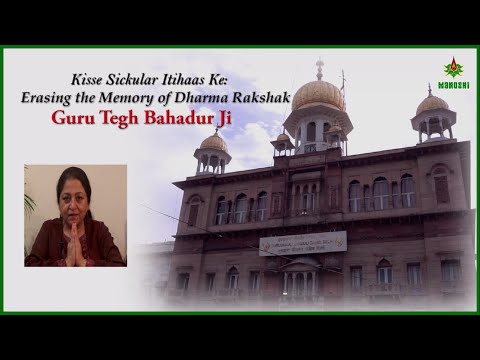We join Manushi in urging you to rename the Fountain Chowk at Chandani Chowk in Delhi as Sis Ganj/Bhai Mati Das Chowk.
As you well know, the Chandni Chowk area is currently undergoing a major redevelopment programme. You may also know that this project is an offshoot of an ongoing PIL filed by MANUSHI in the Delhi High Court in the year 2006. Ironically, the entire plan of the Chandni Chowk Redevelopment is focused around recreating and celebrating, in a modernist idiom, the imagined grandeur of Mongol heritage sites from the Red Fort to Fatehpuri Masjid. But those handling this project have not shown any awareness of two very important sacred sites in the Chandni Chowk area, namely the Sis Ganj Gurudwara and Bhai Mati Das Museum. The area between them was named the Fountain Chowk to honour a waterless fountain standing there as a relic of British raj. Gurudwara Sis Ganj and Bhai Mati Das Memorial are symbols of the heroic resistance of our Guru Tegh Bahadur and his three comrades—Bhai Mati Das, Bhai Sati Das and Bhai Dyala– against forced conversions and brutal subjugation to Islamic tyranny.
In May 1675, Guru Tegh Bahadur was approached by Brahmins from Kashmir who sought his assistance in stopping the onslaught of forced conversions of Hindus ordered by Aurangzeb. As per legend, Guru Tegh Bahadur decided to stand up for freedom of his people to stay within the fold of their own faith and sent a message to Aurangzeb that if he could first convince him to become a Muslim, then the Brahmins would also convert. Guru Tegh Bahadur left Anandpur for Agra to face Aurangzeb at his durbar along with his three companions, Bhai Mati Das, Bhai Sati Das, and Bhai Dyala who all knew they were courting death by joining their Guru. All four were arrested en route and taken in chains to Delhi and locked up in prison from July to November 11, 1675. During their incarceration, Guru Tegh Bahadur and his three companions were starved and tortured mercilessly. When these brutalities did not result in their yielding to conversion, Aurangzeb ordered that Guru Tegh Bahadur be beheaded. To test his resolve further, Aurangzeb told his minions to first slaughter the Guru's companions before his eyes hoping that the sight of their suffering might shake Guru Tegh Bahadur’s resolve and pressure him to save himself by agreeing to embrace Islam. Bhai Mati Das, chosen to be the first martyr was tied between two erect flat logs of wood and sawed alive from head through torso till he bled to death. The next to be martyred was Bhai Dyala. When he too refused to convert. He was seated in a large vessel, which was then filled with water. Then they lit fire to the wood piled beneath so that the boiling water scalded Bhai Dyala to death. Then came the turn of Bhai Sati Das who also stood firm and refused to accept Islam. Enraged at this, the Qazis ordered that Bhai Sati Das be wrapped in cotton wool, which had been soaked in oil. The cotton was then set afire and he was roasted alive. The three brave martyrs kept chanting Japji till their last breath.
Despite witnessing such horrors, Guru TeghBahadur did not yield to conversion. So he too was beheaded halaal style in Chandini Chowk on the 24th of November, 1675. Gurudwara Sisganj stands at the site where Guru TeghBahadur was beheaded. These four heroes of our history are the most awesome Satyagrahis India has ever produced. Mahatma Gandhi’s satyagraha was baby stuff in comparison. The Sikh community kept the sacredness of that site in their hearts and minds and built a gurudwara in 1930’s since it was not possible to commemorate those sites under Islamic rulers. It is time we commemorate these great men as the centrepiece of the Chandni Chowk Redevelopment Programme. The Fountain Chowk should be renamed as Sis Ganj/Bhai Mati/Sati/Dyala Chowk since it stands between the two historic buildings. By erasing the from memory the awe-inspiring resistance to tyranny offered by our Gurus, today only those officially designated as Sikhs or people of Punjab own up to the Sis Ganj Gurudwara. The rest of Indians have been made to forget their connect with the great Gurus. This diminishes Guru Tegh Bahadur’s status to the leader of a panth, whereas he and his comrades should be remembered as national heroes and the site of their martyrdom treated as a national monument. In addition, the government should consider converting the Town Hall building into a museum of Delhi’s history – pre-Islamic, post-Islamic, British and post-independence era. We can’t afford our younger generation grow so ignorant about our past because those those who don’t learn from the past are condemned to repeat its blunders.
Subscribe to our YouTube Channel:
Manushi India (https://www.youtube.com/c/manushiIndia1Manushi/videos)
Like, Share and Comment.

